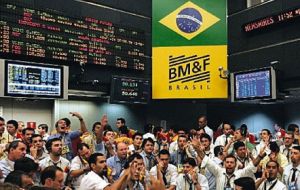MercoPress. South Atlantic News Agency
Brazil’s Real at its highest in eight months; government promises a cap
 “Flood” of dollars forecasted with the planned share sale by Petrobras
“Flood” of dollars forecasted with the planned share sale by Petrobras Brazilian Finance Minister Guido Mantega said the government won’t allow the Real to strengthen excessively as the currency reached its strongest in eight months.
“We will take the necessary measure to avoid inappropriate gains” Mantega said on Thursday in a speech in Recife, the capital of the northeastern state of Pernambuco. “We won’t allow the strengthening of the Brazilian currency.”
The central bank held on Thursday two dollar-purchase auctions in a bid to stem the rally. The currency, which advanced 0.4%, is appreciating on speculation that stock offerings and overseas bond sales will boost dollar inflows this year. A share sale planned this month by Petrobras, the state oil company, is set to be the world’s biggest.
Mantega’s threats to intervene in the currency market aren’t enough to persuade traders that the real won’t strengthen, said Diego Donadio, a Latin America strategist at BNP Paribas in Sao Paulo.
“At this point in the game, talking won’t be as effective as it had been a while ago” Donadio said. “With the dollar flow that is in the pipeline, it won’t be possible to contain the currency appreciation without taking real measures”.
Mantega said banks’ bets against the dollar totaled 13 billion USD in the futures market. The Real has gained 4.9% in the past three months and closed Thursday at 1.7203 per U.S. dollar.




Top Comments
Disclaimer & comment rules-

-

-

Read all commentsYou ain´t see nothing yet, wait until they capitalise Petrobras.
Sep 10th, 2010 - 06:34 pm 0@José
Sep 11th, 2010 - 02:16 pm 0This is about the Economist text you'd indicated on the Peru topic. On it I must say this: it's a bit revisionistic. It purposes to study 5 countries - Brazil, México, Chile, Peru and Colômbia - that have supposedly embraced globalization. Now, who says that? who says those countries have embraced globalization? Or who says their “success” has to do with such policy? Brazil, for instance: is it a globalized country? Imo, it isn't: it's the most protectionist country in South Am. It passes as “globalized” perhaps because the economic production carried out by the state is relatively small. Or so it seems. The state participation is actually large. The thing is, it occurs in indirect manner: for instance, by furnishing stimuli and credit, establishing partnership contracts with private enterprises, etc. - policies adopted since 2007, precisely when, as the text notices, Brazil started to grow at decent levels. When it was more plausibly globalized, from 1995 till the mid 2000s, that is to say, when it pulled back state spending and began to rely on privatization to give a new vigour to the economy, was precisely when the country's growth was at its lowest.
As for Chile, it's indeed a globalized nation. Its tariff imports, for instance, are lower even than those of the US. And it's indeed a success story. As compared to other LatAm countries, it has one of the lowest poverty rates and the highest political stability. But does that have anything to do with globalization? Yes, it has to do with trade - but there's one negative aspect about Chile's consistent trade surpluses: they relie too heavily on low value-aggregate exports. It has one of the lowest rates of hi-tech exports amongst the major LatAm country: 6%. That compares with Argentina (9%), Brazil (12%) and Mexico (19%). So, Chile's success has more to do with its natural resources. And its extreme market opening probably prevents it from building its own advanced industry. The same applies to Colombia.
Forgetit87,
Sep 11th, 2010 - 05:13 pm 0The Economist magazine is definitely a clear example of a gang of old orthodox economic analysts who want to continue reading macro economic events through the same old distorted keynes-friedman manuscript.
I think Brazil is a prime example of a country doing the right thing, I mean the real Right Thing, not the obsolete “right thing” the IMF wants it to be.
As a principle of faith, these economists have recommended every country to open its markets, raise their interest rates, increase their fiscal reveneues and let their currency slide in order to make their economies “more competitive” and while under certain circumstances and market conditions these measures may work, they are far from being infallible. Many countries fall into this infallible dogma, which when they find out that this formulas don´t work for them, unfortunately resort to some other equally “infallible” dogma.
Brazil has done exactly the opposite, it has protected its internal markets, and strenghten the Real.
So while Mexico, the good boy of the IMF, the World Bank and every other global governing bodies, continued opening its economy and let its currency slide, and as a result we have seen our economy dragged behind the US recession, imperiled by both internal and external factors and we have not been able to strenghten our internal market (something you pointed out in a previous thread).
Check this report that just came out at bloombergs rests your case, and mine:
http://www.bloomberg.com/news/2010-09-08/real-beats-mexican-peso-as-growth-insulated-from-u-s-slump-brazil-credit.html
Commenting for this story is now closed.
If you have a Facebook account, become a fan and comment on our Facebook Page!